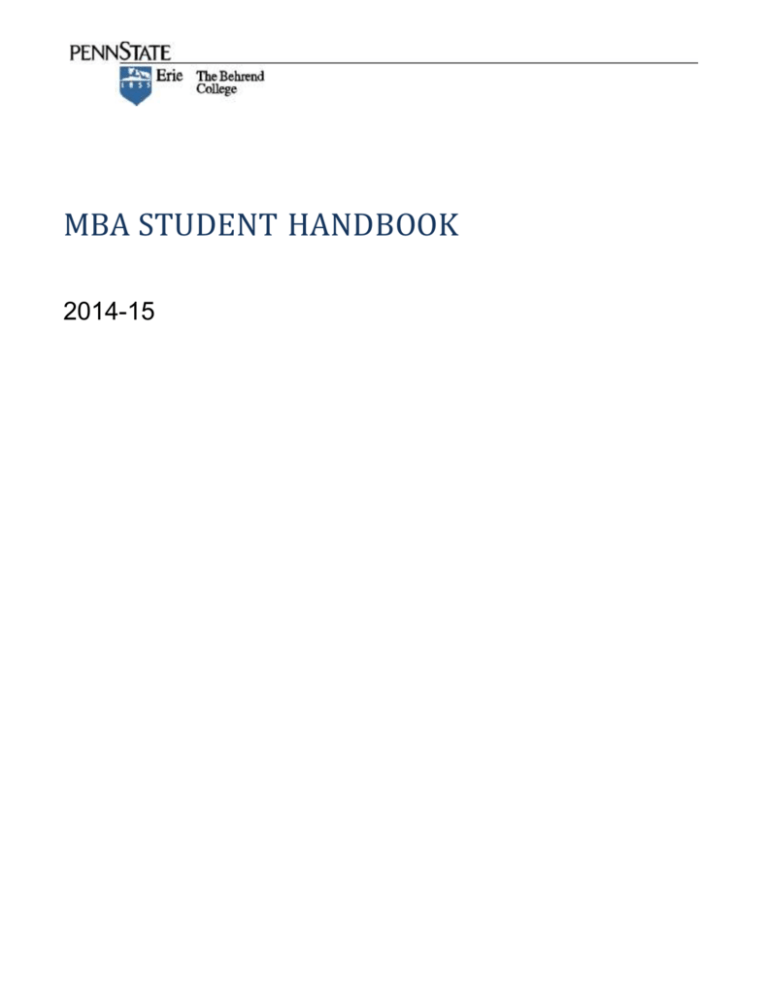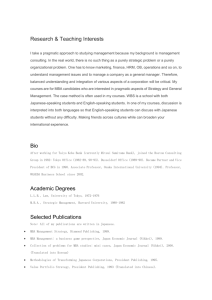MBA Student Handbook - Penn State Behrend
advertisement

MBA STUDENT HANDBOOK 2014-15 Graduate School Policies All Penn State University policies regarding graduate students are explained via the Graduate School Web site. Scholarship and Research Integrity (SARI) Training Requirements Penn State University requires Scholarship and Research Integrity (SARI) training for all graduate students. This requirement is based on a set of guidelines developed through the Office of the Senior Vice President for Research and the Office for Research Protections (ORP). The SARI training consists of two parts: (1) online (CITI) training offered through an external web site and (2) five hours of discussion-based responsible conduct of research (RCR) training. SARI training has deadlines for completion of both parts of this training. Details will be provided during Orientation. PSU Immunization Requirements Penn State policy requires full time, degree-seeking students accepted to Penn State to provide documentation of immunization against Measles, Mumps and Rubella. After you have been accepted to Penn State, you will receive a packet of information from the University Health Services Office at University Park. It will include an explanation of immunization requirements and a Health History Form which you will have to complete online. In order to assure immunity, the following doses are required: Measles: two doses of Measles (Rubeola) vaccine Mumps: one dose of Mumps vaccine Rubella: one dose of Rubella vaccine The first vaccine must be given after 12 months of age. The second vaccine must be given at least one month after the first vaccine. Exceptions: The following students are exempt from the Pre-Matriculation requirements – provisional or non-degree students and students who are enrolled in World Campus and distance education programs. Penn State’s Computing Technology A Penn State Access Account provides students with a PSU e-mail account and consists of a user ID and password that enables Penn State students, faculty, and staff to use the full range of on-line services and resources on or off campus. Your user ID is the "public" part of your Penn State Access Account. This is the part you should share with others so that they know where to send electronic mail. Your user ID (sometimes referred to as "username" or "userid") is usually your initials followed by a 1- to 3-digit number such as xyz101. The letters are lowercase. Your password is the “private” part of your Penn State Access Account. You should not share your password with anyone and should regularly change your password for continued security on your PSU accounts. PSU e-mail accounts will be a prominent method of communication in all MBA courses. Get in the habit of checking your PSU e-mail account frequently. If you normally use another internet service provider (ISP), please consider forwarding your PSU e-mail to your alternative ISP account so you will be sure to receive important program communications. eLion eLion is a Web-based interactive service for Penn State students. Through eLion, you can access your academic records by entering your access account and password. The main components of the student section of eLion include academic record summary, address information or updates, bursar student accounting, financial aid information including the ability to adjust your Stafford loan amounts, grade reports, hope/lifetime tax credit, term cumulative grade point average (GPA) calculation, term bill, and transcripts. Academic Integrity Maintaining academic integrity—scholarship free from fraud and deception—is an important educational objective of the Penn State Behrend MBA Program. Academic dishonesty can lead to a failing grade and/or other disciplinary action. Academic dishonesty includes, but is not limited to, cheating, plagiarism, fabrication of information or citations, facilitating acts of academic dishonesty by others, unauthorized prior possession of examinations, submitting work of another person or work previously used without informing the instructor and securing written approval, or tampering with the academic work of other students. In cases where academic integrity is questioned, a student will be given oral or written notice of the charge by the instructor. Procedures allow for a student to appeal the charge through informal discussions with the instructor, department head, dean, or campus executive officer. If a failing grade or referral to the Office of Conduct Standards is recommended, the student and instructor will be afforded formal due process. Plagiarism The Pennsylvania State University insists on strict standards of academic honesty in all courses. Any plagiarism will be penalized severely. The following discussion has been prepared so that no student will commit plagiarism out of ignorance. Plagiarism is the act of passing off someone else’s work as your own. It sounds like simple dishonesty, and it often is. Anyone who buys, borrows, or steals a paper to turn in as his or her own work is plagiarizing. Anyone who copies word for word or who fundamentally copies by changing only a word here and there, without enclosing the copied passage in quotation marks and identifying the author, is plagiarizing. Plagiarism can be more complicated in act and intent, however. Paraphrasing, in which someone else’s work is restated in different words, is often a useful device, but it can lead to unintentional plagiarism. It is possible to forget that the basic work belongs to someone else. If the paraphrase is close to the original in length and content, such forgetfulness is unlikely. It is easy to read a book or article, put it down, pick up a pen and begin to write down thoughts and words that come from reading and forget where they came from. You might be shocked, if you looked at the original, to discover how closely you had reproduced it. It is also easy to jot down notes and ideas from many sources and forget to keep track of those sources. The resulting paper may be only a mosaic of others’ words and ideas. This, too, without proper identification of sources is plagiarism. The conscientious writer keeps careful track of sources and diligently tries to distinguish between what is his or her own work and what comes from others. This can be difficult. All of us pick up ideas from friends, family, and our own reading without being conscious of it. Ideas that are common—public property, so to speak—need not, and often cannot, be documented. Ultimately, it is a matter of judgment whether credit needs be given for material in your paper. Did part of what you are saying come from an identifiable source? Say so. If in doubt, talk to your instructor. In any event, note that your instructors can only see the outcome, not the intent, so we treat such outcomes as violations. Original writing consists of thinking through ideas and expressing them in your own way. The result may not be new, but if honestly done, it may well be interesting and worthwhile. Other people may add to your thoughts. When they do it in identifiable and specific ways, give them the credit they deserve. Academic dishonesty is a serious offense; you should be fully aware of its consequences. If you feel you do not have an adequate understanding of plagiarism, ask your instructor or request more information from the Sam and Irene Black School of Business Office. Grading Policy Grades are given solely on the basis of the instructor's judgment as to a student's scholarly attainment. Any one of nine quality grades (A, A-, B+, B, B-, C+, C, D, F) may be given to a graduate student for course work. A grade of A indicates exceptional achievement; a grade of B indicates substantial achievement; a grade of C indicates acceptable but substandard achievement; a grade of D indicates inadequate achievement and is a failing grade for a graduate student. A required course in which a D has been obtained cannot be used to meet degree requirements. A grade of F indicates work unworthy of any credit and suggests the student may not be capable of succeeding in graduate study. The grade-point equivalents for each possible grade are 4.0, 3.67, 3.33, 3.0, 2.67, 2.33, 2.0, 1.0, and 0, respectively. Changes in assigned and recorded grades are possible only to correct errors made in calculating or recording the grades, not to allow a student to improve a grade ex post facto, or to permit long-delayed completion of a course. Senate Policy states in the Student Guide to University Policies and Rules that no grade change can be made more than one year after the end of the term in which the course was taken. Deferred Grades If work is incomplete at the end of a term because of extenuating circumstances, the instructor may report DF in place of a grade, which will appear temporarily on the student's record. It is not appropriate to use the DF either casually or routinely to extend a course beyond the end of the term or to extend a course for a student who has failed so that the individual can do extra work to improve the grade. The DF must be removed (i.e., the course must be completed) within nine weeks of the beginning of the succeeding term (six weeks for summer). If the course is not completed and a grade assigned within the extended time period, a grade of F replaces the DF. Unsatisfactory Scholarship The Penn State Graduate Degree Programs Bulletin describes unsatisfactory progress to be "one or more failing grades or a cumulative grade-point average below 3.0 for any term or combination of terms....” If you exhibit unsatisfactory scholarship, you will be asked to achieve a cumulative grade-point average of 3.0 within your next 12 credits and maintain a cumulative grade-point average of 3.0 or better until all other degree requirements are completed. A minimum grade-point average of 3.0 is required for graduation. Grade Reports The For Students component of eLion gives you immediate access to semester grades as soon as they are submitted by the instructor and recorded by the Registrar’s Office. Term grades are not automatically mailed to students. You must request that your grades be mailed to you by following these steps. This must be done each semester. 1. Go to the eLion web site 2. Select For Student 3. Penn State User Authentication Page Enter Access Account User ID Enter Access Account Password 4. Select Mail Semester Grades 5. At next screen – Select Mail Semester Grades again 6. Select Send Grade Report Drop a Course The drop procedure is used when a student needs to drop a course but still continues to be enrolled in at least one other course during the same term. Refunds are made on a sliding scale, depending on when the Registrar’s Office is notified. If a student stops attending a class and neglects to notify the Registrar’s Office, the grade for the course will become an automatic "F" which becomes a part of the student's permanent record. Tuition Adjustment Policy (in brief) Tuition charges are calculated as of the first day of the semester/session. Requests to cancel registrations or reduce credits should be made prior to the first day of the semester/session to avoid being charge a portion of the tuition. Charges are adjusted b ased on the date of the last class attended, provided the official withdrawal form is presented within one calendar month of that date; otherwise, the adjustment will be based on the date the form is presented in the Registrar’s Office. C o n t a c t Penn State Behrend Bursar’s Office at 814-898-6224. Note that adjustments do not apply to fees. Withdrawal Students not able to complete a schedule of courses for a given semester may withdraw from enrollment in all courses any time up to and including the last day of classes. Doing this constitutes withdrawal from the University and changes a student’s status to non- degree. Withdrawing students must notify the Graduate Admissions Office immediately for details. If a student neglects to complete a withdrawal form, the instructor may assign the grade of "F" for the course. Note that reenrollment is not automatic. Students who withdraw must submit a Resume Study application with the Graduate Admissions Office. If readmitted to the program, students complete the MBA program in place at the time that they reenroll, just as a new student would. Continuous Registration An MBA student who completes consecutive terms without interruption (not including summer terms) is considered to have maintained continuous registration. Students who withdraw or miss a semester due to career or personal responsibilities may request to resume study by emailing Graduate Admissions. Readmission requires satisfactory scholarship and available space in the program. Time to Complete Degree The Graduate School allows a maximum of eight years for completion of MBA requirements. Graduation Students who plan to graduate at the end of a term are responsible for filing an intent to graduate on eLion. Students who are removed from the graduation list will need to initiate their intent to graduate again for the semester in which they do plan to graduate. Transfer of External Credit The MBA program will accept up to nine credits of graduate course work done at an accredited institution. This translates into three courses, practically speaking. Acceptance of transfer credits requires that the content of prior course work match the courses/credits they replace in the program. Most of the MBA content is fixed so transfer credits must fit the criteria in the program. Transfer credits can be used as elective credits if the course(s) are appropriate for an MBA program. Transferred graduate work must have been completed within five years prior to being admitted as an MBA degree candidate, must be of at least B quality, and must appear on an official graduate transcript of a regionally-accredited institution. Pass/fail grades are not transferable to an advanced degree program unless the former institution substantiates that a “pass” is equivalent to a grade of B (3.0) or better. Quarter credits must be converted to semester credits. Approval to apply any transferred credits toward a degree program must be granted by the MBA Program Director and the PSU Graduate School. To request transfer of credit, submit an official graduate transcript and course syllabus (or complete description of course) to the MBA Program Director. Transcripts Unofficial transcripts for currently enrolled students are available through eLion. Unofficial transcripts cannot be mailed or faxed to students. To obtain an official transcript, complete the form available on line and send your request with a check for $6 (fee subject to change without notice). To obtain the form, visit the Registrar home page and select “Order Transcripts on the Web.” Transcript requests are normally processed within three working days of receipt. Standard delivery of transcripts is by first class U.S. postal mail. Special delivery is available for an additional fee. Confidentiality of Student Records The University recognizes individuals’ privacy and the confidentiality of student records as described in the Family Educational Rights and Privacy Act of 1974. Certain directory items may be released without the student’s permission and may be made available to the public without prior consent as they are considered part of the public record of attendance. Students are entitled to request that these directory items not be made publicly available. Tuition Reimbursement Forms Students who will be reimbursed by their employer for the satisfactory completion of specific credit courses c a n defer the portion of employer funding to the end of the semester, provided they submit a Tuition Reimbursement Approval Form. A new tuition reimbursement form must be submitted each semester, and only the latest version of the form will be accepted. Forms may be obtained in the Penn State Behrend Bursar’s Office, the College Registrar’s Office, or from the web site: http://psbehrend.psu.edu/Academics/academic-services/bursar. Students can request a form by contacting the Bursar’s Office at 814-898-6224. Completed forms should be returned to the Bursar’s Office. If completed forms are returned by mail, they should be sent to: Penn State Behrend, Bursar’s Office, 4651 College Drive, Erie, PA 16563-0102. Students receiving tuition payments from their employer can have the Bursar's Office bill their employer directly, sign their reimbursement check over to the college, or write a personal check covered by their reimbursement funds. Registration Holds Some University offices are authorized to place registration holds on student records. Typical holds are either academic holds placed by the college offices, or financial holds placed by the Bursar, University Libraries, etc. Placing a registration hold immediately stops the student from adding courses for the current and future terms. Holds will be put in place for unsatisfactory scholarship, late payments, non-payment, or failure to meet immunization requirement. Independent Study and Internships An Independent Study is typically a 3 credit hour elective course designed by a student with a graduate faculty member to explore a topic of the student’s interest that is not covered in available courses. A student may request an Independent Study as a means of finishing elective courses necessary to earn the MBA if the student is relocated by an employer. An Independent Study cannot be used as a substitute for an Advanced Required Course. Internships are also typically three credit hour electives, providing real-world work experience for students and making them more competitive in the job market. Independent Studies and internships must be approved by the Director of the MBA Program in consultation with the supervisory MBA faculty member. Considerations for approval of Independent Studies projects will include, but are not limited to: Previous experience of the student Student’s GPA – must be at least a 3.00 Reason for the Independent Study Usefulness of the Independent Study Number of hours of work by the student that the Independent Study is expected to entail – should be at least 90 hours for a 3 credit course Availability of a course that covers the same material – If a comparable course is available within the year, the Independent Study will not be approved. In order to schedule an Independent Study, you should discuss the topic with an appropriate professor in the MBA Program. For example, if the proposed study is related to finance, a finance professor must be the supervising faculty member. Professors will work on Independent Studies as their schedules permit. Independent Study projects can be arranged with non-MBA faculty. These would be treated as undergraduate 496 courses and subject to the two 400-level class rule. That is, a 496 project would count as one of the permissible two 400 level classes in a student’s MBA program. If a faculty member is willing and able to work with the student, the MBA Independent Studies Approval and Records Form should be completed by you and the professor. The form is available in the Black School of Business Office or from the Director of the MBA Program. That form should be submitted by the professor to the Director of the MBA Program within the first ten days of the semester. The student must then register for the course through the Registrar’s Office, either in person or on-line. Independent Studies must be completed during the semester for which the student registers for the Independent Study. Extensions will be given only when either the student or the professor has an emergency situation occur. The requirements for Internships include completion of the Advanced Required courses in the MBA program, the identification and consent of a supervising graduate faculty member, and submission of the MBA Internship Application Form. The A c a d e m i c a n d Career Planning Center can assist with identifying opportunities and st preparing you for your internship search. Contact the ACPC Office in the Reed Union Building (1 floor, west end) at 8 1 4 - 898-6164 to make an appointment. You may not do an internship with your current employer. No more than three credits in total can be earned through Independent Study or Internships Employment Relocation On occasion, MBA students are relocated by their employers while the student is enrolled in the MBA Program. If this happens to you, contact the Director of the MBA Program. We will make every effort to assist students in this situation. It is unlikely that arrangements can be made to finish courses mid-semester so it best to delay the relocation until the end of the semester when that is possible. In addition, Advanced Required Courses must be taken on campus. Elective courses might, however, be available through other universities’ MBA Programs (a maximum of nine credits can be transferred into the Penn State Behrend MBA Program) or through Independent Studies. Arrangements to meet program requirements using these or other alternatives must be made by the student in consultation with the Director of the MBA Program. Official transcripts for courses taken in other programs should be sent to the Director of the MBA Program. Relocated students must still complete the Intent to Graduate form when their course work is done. Course Absenteeism Attendance at MBA classes is required. It is MBA faculty policy that a student who misses more than three classes automatically fails the course. If a student anticipates that work will call for missing that many classes, it is best not to register for that course. Individual faculty may have their own attendance policies which may include participation grades based on attendance or grade related penalties for absences. Individual faculty may also have policies regarding make-up examinations. See the syllabi of courses and their instructors for further information regarding policies on absenteeism. Faculty websites p r o v i d e s y l l a b i a n d d e t a i l s f o r currently offered courses. Foundation Core Course Exemption Guidelines Review the following guidelines if you wish to be considered for exemption from any part of the foundation core requirements based on your previous academic background. If you believe you meet the criteria stated below for exemption from one or more foundation core courses, you can informally request confirmation via email from the Director of the MBA program. When a student is offered admission, he/she is asked to complete a formal request for exemptions; this will be submitted prior to the initial registration for courses. Once registered for a course, no exemptions will be allowed for either previous coursework or through credit by examination. Your request must identify the Penn State Behrend MBA Foundation Core course from which you are requesting an exemption and the specific course or courses you previously competed that you believe qualify you for an exemption. Baccalaureate degree requirements must have been completed no more than seven years prior to your admission to degree status with a grade of B or higher in relevant courses. Identify which specific course or courses you have completed that relate to each of the specific topics associated with the foundation core requirements. Attach supporting documentation such as appropriate course descriptions and/or syllabi to your request. Course descriptions and syllabi are not required for courses completed at Penn State. Exemptions are granted for Foundation Core Courses including: B ADM 501: Costs, Competition, and Market Performance – undergraduate curriculum must include separate courses in accounting, economics, and finance. B ADM 502: Demand, Operations, and Firm Performance – undergraduate curriculum must include separate courses in management (organizational behavior), marketing, and operations management. B ADM 503: Integrated Business Analysis – undergraduate course in statistics. Credit by Examination If you believe you have acquired substantial knowledge in a subject through industry experience or professional education you may apply to the director of the MBA program for permission to take an examination in a specific subject or subjects needed to fulfill part or all of the criteria associated with the above foundation core exemption requirements. Exams must be taken during the day prior to initial registration for courses. 400 level Electives Students can take up to six credits of 400 level business classes as electives in the MBA program. Course work at the 400 level must be approved by the director of the MBA program and cannot have been used for another degree. Full time and part time student course loads For scheduling purposes, the Penn State Behrend MBA program distinguishes between part time and full time status. Part time students are limited to six credit hours in an academic term. Full time students can enroll in a maximum of twelve credit hours per term. Textbooks Students can buy textbooks at the University bookstore located in the Reed Union Building. Students can pick up the books or have them postal mailed for an additional shipping charge. Phone & Fax Numbers Sam and Irene Black School of Business Office: 814-898-6107 Fax: 814-898-6223 Director of the MBA Program Office: 814-898-6323 Fax: 814-898-6223 Academic & Career Planning Center Office: 814-898-6164 Fax: 814-898-6455 Bookstore Office: 814-898-6236 Fax: 814-898-6423 Bursar’s Office Office: 814-898-6224 Fax: 814-898-7595 Financial Aid Office Office: 814-898-6162 Fax: 814-898-7595 Graduate Admissions Office Office: 814-898-7255 Fax: 814-898-6053 Lilley Library Office: 814-898-6106 Police & Safety Services Office: 814-898-6101 Registrar’s Office Office: 814-898-6104 Fax: 814-898-6382 Rev. Sept 2014







